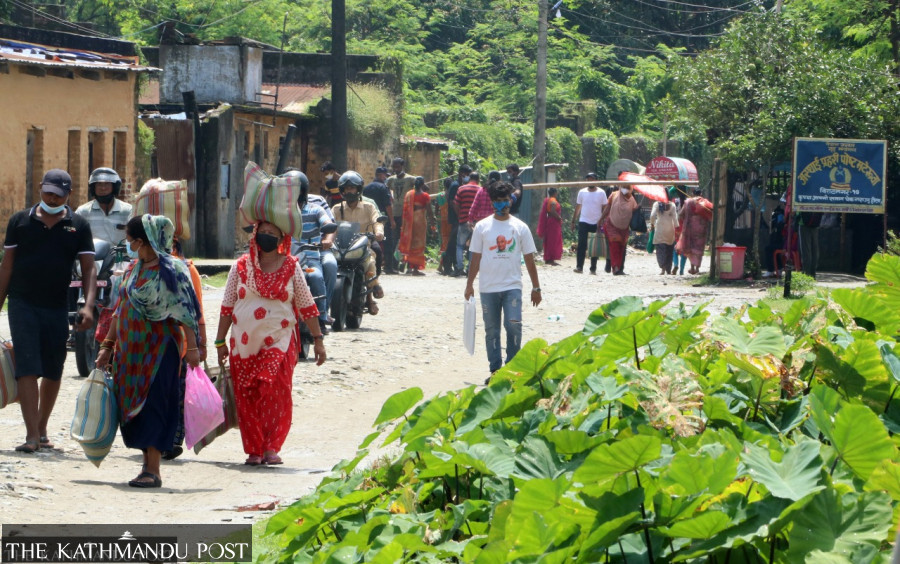Health
Unmanaged border crossings may expose Nepal’s Achilles heel in stemming Covid-19
Tens of thousands of people enter the country daily through checkpoints set up at various land crossings with India.
Arjun Poudel
All eight districts of Province 2 have laboratories to carry out polymerase chain reaction tests. But officials hate to be asked anything about the international land crossings, which are still running as a mess 21 months after the start of the Covid-19 pandemic.
Health desks set up at various border crossings in the province have not been screening travellers. Given the porous border, more people travel in and out of the country through illegal land crossings than from legal checkpoints set up by the authorities.
“We could not manage the land crossings properly despite the growing risks,” Dr Shrawan Kumar Mishra, chief of the Provincial Public Health Laboratory, told the post over the phone from Janakpur. “Some health desks do not have sufficient manpower and some do not have trained manpower, among other problems.”
With the Dashain festival approaching, the number of people returning to the country multiplies. What is concerning from the pandemic point of view is officials have no records of the people coming back to their villages and hometowns.
It is estimated that up to 100,000 people enter the country daily during Dashain through official checkpoints set up at various land crossings with India.
“At the health desks, we take temperatures of the people entering the country and also conduct antigen tests of those who have fever,” Ram Bahadur Chand, chief of the health section of Nepalgunj Sub-metropolitan City, told the Post over the phone.
“But we can’t test people entering the country from illegal land crossings, and unfortunately there are hundreds of such points.”
Chand said that over 700 people enter the country every day from Jamuniya checkpoint and the numbers will increase several fold in the coming days.
Public health experts say that lack of mandatory health screening at border points shows the government’s carelessness about public health and the handling of the pandemic. They said that the authorities’ reactive approach—scrambling for quick fixes after problems start—could spell another disaster for the country.
“The government's lack of seriousness in tackling the pandemic is evident from the preparations,” Dr Tulsi Ram Bhandari, a public health expert and assistant professor at Pokhara University, told the Post.
“What could be more shameful than admitting that there is no mechanism to keep record of people entering the country? Doesn’t the government know that thousands of Nepali migrants return home from India for Dashain?”
Public health experts say that everyone entering the country through border crossings should be screened and those coming from disease-hit areas should be quarantined or placed in isolation for a certain number of days.
The authorities should keep detailed records on their condition and monitor their movement to reduce the risk of disease transmission.
Of late several other diseases including dengue, malaria, seasonal influenza and Nipah virus have been reported in India. Doctors say the possibility of these diseases entering Nepal is high given the lack of screening of people on the border.
Also, more people have been returning home via the Tribhuvan International Airport. Officials at the Ministry of Health and Population claimed that they have been rigorously screening everyone entering the country by air.
“The protocol for health screening has not changed so everyone entering the country must produce a negative PCR test report not older than 72 hours,” Dr Hemanta Ojha, an official at the Epidemiology and Disease Control Division, told the Post.
When asked about the hundreds of land crossings along the over 1,850 kilometre-long open Nepal-India border, Ojha admits that screening is difficult.
“We all know the difficulties but still we should make honest efforts to keep records of people entering the country,” he said.
Experts say that even if new Covid-19 cases have declined in recent days, they could rise in the coming days given the rapid unlocking of public spaces.
“Even if a large-scale outbreak does not happen, cluster outbreaks could occur from the infection brought by the migrant workers,” Dr Krishna Man Shakya, vice-president of Nepal Public Health Association, told the Post.
Doctors say along with mandatory health screening of returnee migrant workers, authorities should vaccinate as many people as possible and develop a database of the vaccinated population.
“We should not underestimate the risks,” Dr Baburam Marasini, former director at the Epidemiology and Disease Control Division, told the Post. “Authorities should conduct rigorous screening of returnees and improve the surveillance system.”
Officials at the Ministry of Health and Population admit that the risk of new outbreaks has increased due to the increased inflow of people from India and other countries.
“Yes, risks will definitely increase,” Dr Samir Kumar Adhikari, joint spokesperson for the Health Ministry, told the Post, adding, “We have directed government agencies to increase surveillance along the border.”




 16.12°C Kathmandu
16.12°C Kathmandu















